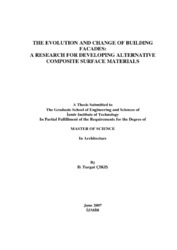Please use this identifier to cite or link to this item:
https://hdl.handle.net/11147/3837Full metadata record
| DC Field | Value | Language |
|---|---|---|
| dc.contributor.advisor | Günaydin, Hüsnü Murat | en |
| dc.contributor.author | Çıkış, Dilaver Turgut | - |
| dc.date.accessioned | 2014-07-22T13:52:29Z | |
| dc.date.available | 2014-07-22T13:52:29Z | |
| dc.date.issued | 2007 | en |
| dc.identifier.uri | http://hdl.handle.net/11147/3837 | |
| dc.description | Thesis (Master)--İzmir Institute of Technology, Architecture, İzmir, 2007 | en |
| dc.description | Includes bibliographical references (leaves: 107-110) | en |
| dc.description | Text in English; Abstract: Turkish and English | en |
| dc.description | xi, 110 leaves | en |
| dc.description.abstract | Cladding of buildings is an important and commonly applied activity area of building sector. As it is known major purpose of cladding is to separate the indoor environment from the outdoors in such a way that indoor environment conditions can be maintained at level suitable for the buildings intended use. Therefore from the functional point of view it can be defined as, the part of the building that is non load bearing exterior wall that must defend the interior spaces against invasion by water, wind, sun, light, heat and cold, and all the other forces of nature. Besides this it must also fulfill the aesthetic, economic and security consideration. The design of the building façade has become much more complicated with development of new methods of construction, the requirements for a highly controlled interior environments, stress on energy efficiency, advent of materials and new production methods. But it seems that available technologies on ordinary building sector relay on the analog production methods. Analog production process depends on technical drawings and the interpretation of drawings. The human interpretation is the basics of the systems. On the other hand, new design tools that introduced by computer aided design programs proposes new conceptions of space that beyond the limits of Cartesian understanding of form and construction. It is known that computer aided design and production methods are applied pervasively in numerous different sectors. Articulation of computer aided design and manufacturing processes with digitally driven assemblage methods is an important task that is expected to be solved by the building sector. Building envelope systems as being one of the most important building component from the points of both identity and utility of buildings, is has to be reconsidered as a part of the adaptation of whole construction sector. It is also a measure of responsibility on the part of architects. Besides material design, production processes, and connection details of the components with the other parts of the building are the other important dimensions of the envelope systems. | en |
| dc.language.iso | en | en_US |
| dc.publisher | İzmir Institute of Technology | en |
| dc.publisher | Izmir Institute of Technology | en_US |
| dc.rights | info:eu-repo/semantics/openAccess | en_US |
| dc.subject.lcc | NA2728. C57 2007 | en |
| dc.subject.lcsh | Architectural drawing--Computer-aided design | en |
| dc.subject.lcsh | Architectural design--Data processing | en |
| dc.subject.lcsh | Facades--Design and construction | en |
| dc.title | The evolution and change of building facades: A research for developing alternative composite surface materials | en_US |
| dc.type | Master Thesis | en_US |
| dc.institutionauthor | Çıkış, Dilaver Turgut | - |
| dc.department | Thesis (Master)--İzmir Institute of Technology, Architecture | en_US |
| dc.relation.publicationcategory | Tez | en_US |
| item.languageiso639-1 | en | - |
| item.fulltext | With Fulltext | - |
| item.openairecristype | http://purl.org/coar/resource_type/c_18cf | - |
| item.openairetype | Master Thesis | - |
| item.grantfulltext | open | - |
| item.cerifentitytype | Publications | - |
| Appears in Collections: | Master Degree / Yüksek Lisans Tezleri Sürdürülebilir Yeşil Kampüs Koleksiyonu / Sustainable Green Campus Collection | |
Files in This Item:
| File | Description | Size | Format | |
|---|---|---|---|---|
| T000619.pdf | MasterThesis | 27.25 MB | Adobe PDF |  View/Open |
CORE Recommender
Page view(s)
164
checked on Jul 22, 2024
Download(s)
204
checked on Jul 22, 2024
Google ScholarTM
Check
Items in GCRIS Repository are protected by copyright, with all rights reserved, unless otherwise indicated.